| Srl | Item |
| 1 |
ID:
139278
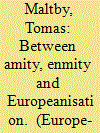

|
|
|
|
|
| Summary/Abstract |
Considering the development of the Bulgarian energy security strategy this article analyses how the country has adapted to EU membership and to energy security challenges, such as disruptions to Russian gas supplies in 2006 and 2009 and rising gas prices. Utilising a conceptual lens which synthesises Regional Security Complex Theory and Europeanisation, the article offers an explanation of energy policy changes. It concludes that conceptions of Russia as an energy security guarantor have changed since Bulgaria's EU accession and that Bulgarian energy policy has undergone a qualified reorientation away from a positive dependence on Russian energy sources, towards a convergence with EU priorities of diversification and a single energy market.
|
|
|
|
|
|
|
|
|
|
|
|
|
|
|
|
| 2 |
ID:
144645
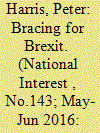

|
|
|
|
|
| Summary/Abstract |
TWENTY-FIVE years ago, Sir Geoffrey Howe resigned as deputy prime minister of the United Kingdom in protest of Margaret Thatcher’s staunch anti-Europeanism. Howe’s departure from the frontbenches came just two days after Thatcher’s denunciation in Parliament of plans for a European single currency (“No! No! No!”), a moment that has since become totemic of what Howe condemned in his resignation speech as the prime minister’s alacrity to undermine her own ministers over European issues.
|
|
|
|
|
|
|
|
|
|
|
|
|
|
|
|
| 3 |
ID:
072184
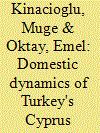

|
|
|
|
|
| Publication |
2006.
|
| Summary/Abstract |
This essay examines the interplay between the domestic dynamics of Turkish foreign policy regarding Cyprus by identifying the main themes formulated by Erdo?an's JDP government and its implications for Turkey's EU membership. It argues that considering the Cyprus issue-once regarded a major obstacle for Turkey's EU bid-as no longer constituting a problem for Turkey's membership has been shortsighted. It concludes that JDP's policy has gradually made the Cyprus issue a precondition for the opening and success of the accession talks, which would in turn be counterproductive with respect to Turkey's EU membership in the medium to long term.
|
|
|
|
|
|
|
|
|
|
|
|
|
|
|
|
| 4 |
ID:
088477
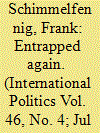

|
|
|
|
|
| Publication |
2009.
|
| Summary/Abstract |
The membership of Turkey is one of the most controversial external relations issues of the European Union (EU). In a comparison of four instances of decision-making on accession negotiations with Turkey between 1997 and 2006, this paper explains why and under which conditions Turkey has progressed on the way to EU membership in spite of persistent and increasing divergence of membership preferences. In line with the entrapment hypothesis of normative institutionalism, the analysis shows that Turkey and its supporters within the EU have been able to overcome the opposition to its membership bid to the extent that Turkey followed the fundamental norms of the EU.
|
|
|
|
|
|
|
|
|
|
|
|
|
|
|
|
| 5 |
ID:
148782
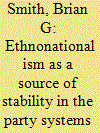

|
|
|
|
|
| Summary/Abstract |
Democratization, economic transformation, and EU accession have shaped the Bulgarian and Romanian party systems in ways similar to that seen across the rest of eastern Europe. A quarter century after democratization, the party systems remain unstable. The article demonstrates that nationalism and ethnic identity provide stable voter salience in party systems that remain dominated by fragmentation, personalistic political parties, and a lack of issue differentiation. An analysis of the use of ethnonationalism by political elites in Bulgaria is contrasted with a briefer analysis of Romania.
|
|
|
|
|
|
|
|
|
|
|
|
|
|
|
|
| 6 |
ID:
165547
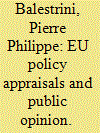

|
|
|
|
|
| Summary/Abstract |
Although the literature about European Union (EU) public opinion is quite extensive, much of it focuses on general indexes of support for the EU or one specific EU policy area. The study of citizens’ appraisal of the EU contribution across socioeconomic policies and its interdependence is uncharted territory. The present article addresses this gap in the research. Using Eurobarometer data, it is demonstrated that national publics tend to be dissatisfied with the EU contribution across policies and that this assessment is consistent and interrelated from one policy to another. Education is found to have only a relatively modest impact on this assessment while the degree of an EU member state’s integration in the world economy is not found to sway the latter. The findings finally show that national levels of unemployment, immigration, income dispersion, and the positioning of party leaderships on social redistribution influence public opinion on EU policy input. In the light of these findings, implications are drawn.
|
|
|
|
|
|
|
|
|
|
|
|
|
|
|
|
| 7 |
ID:
071603
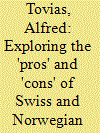

|
|
|
|
|
| Publication |
2006.
|
| Summary/Abstract |
A theoretical appraisal of the Swiss and Norwegian models of relations with the European Union (EU), as well as an empirical assessment of experience accumulated, shows that the European Economic Area (EEA) model is quite constraining. Both models have semi-colonial features. In the EEA model, the non-EU member has a little more influence on decision-making but is less independent of the EU than with the Swiss approach. The latter is time-consuming and is subject to much give and take. In the long run, however, countries expected to benefit from the new European Neighbourhood Policy, such as Israel, might find that an EEA approach is not acceptable if it does not offer membership as a long-term possibility, because it is undemocratic. Finally, in the eventuality of a trade war between the United States and the EU, a scenario of high relevance for Israel, the Swiss model would give it more freedom of manoeuvre than the EEA model. Israel would not be part of the EU trading bloc in the eyes of the United States.This is much less clear in the event of EEA membership. On the other hand, an in-depth examination of the Swiss model shows that the 'à la carte' approach does not allow for any degree of depoliticization in relations with the EU, as Israel was hoping for.
|
|
|
|
|
|
|
|
|
|
|
|
|
|
|
|
| 8 |
ID:
072183
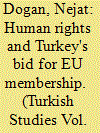

|
|
|
|
|
| Publication |
2006.
|
| Summary/Abstract |
This paper compares and contrasts human rights provisions of the Turkish Constitution with those of the Charter of the Fundamental Rights, incorporated in the draft European Constitution as Part II. It critiques the Turkish Constitution and assesses the convergence of its approach with the European Union's human rights regime on the critical issues of dignity, freedoms, equality, solidarity, civil rights, and justice. While changes are required in Turkey's constitution to bring it into line, the main changes required are the full implementation in practice of rights promised in the legal texts.
|
|
|
|
|
|
|
|
|
|
|
|
|
|
|
|
| 9 |
ID:
140321
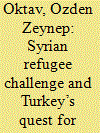

|
|
|
|
|
| Summary/Abstract |
This article examines the Syrian refugee challenge as a case study in order to understand the inherent contradictions evident in Turkey’s efforts to exert normative power in the Middle East. The article is divided into two sections. The first part examines how Turkey has attempted to transform itself from a country that has in the past been accused by elements in the West of “lacking [the] standards of [a] civilization” into a candidate for full European Union (EU) membership. The second part assesses the three main challenges to Ankara’s efforts as they are revealed through its response to the Syrian refugee crisis.
|
|
|
|
|
|
|
|
|
|
|
|
|
|
|
|
| 10 |
ID:
154938
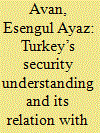

|
|
|
|
|
| Summary/Abstract |
While the end of the Cold War challenged the classical understanding of national security in Europe, Turkey continued to follow a national security-centered and confrontational foreign policy during the 1990s due to its internal and external security problems. Although this created important differences in security understandings and policies between Turkey and the European Union (EU), Turkey continued to seek EU membership during the 1990s. The goal of this paper is to answer why Turkey was willing to join the EU in the 1990s despite its difficulty in balancing its relations with the EU with its security problems. The main conclusion of the paper is that Turkey’s eagerness to join the EU during the 1990s can be explained by both the perception of EU membership as the most appropriate and desired policy for Turkey and Turkey’s eagerness to ensure its political and security objectives.
|
|
|
|
|
|
|
|
|
|
|
|
|
|
|
|
| 11 |
ID:
121179
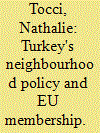

|
|
|
| 12 |
ID:
075246
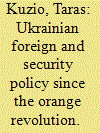

|
|
|
|
|
| Publication |
2006.
|
| Summary/Abstract |
Kuzio instead focuses on the foreign policy in post-revolution Ukraine. The centre of Kuzio's analysis is Ukraine's EU and NATO trajectories. He first analyses Yushchenko's EU and NATO orientations and commitments, which marked a decisive shift from the ambiguous stance of the previous regime. He then surveys the respective positions within the political party system and the public at large on these two foreign policy questions. He concludes that NATO's "open-door policy" as opposed to the EU's policy of passivity and reticence has produced a difference in Ukraine's move towards the former as opposed to the latter. However, the Ukrainian political system and public remain far more reluctant and uncertain about the desirability of NATO with respect to EU membership, casting the country's foreign policy in a potential state of flux.
|
|
|
|
|
|
|
|
|
|
|
|
|
|
|
|